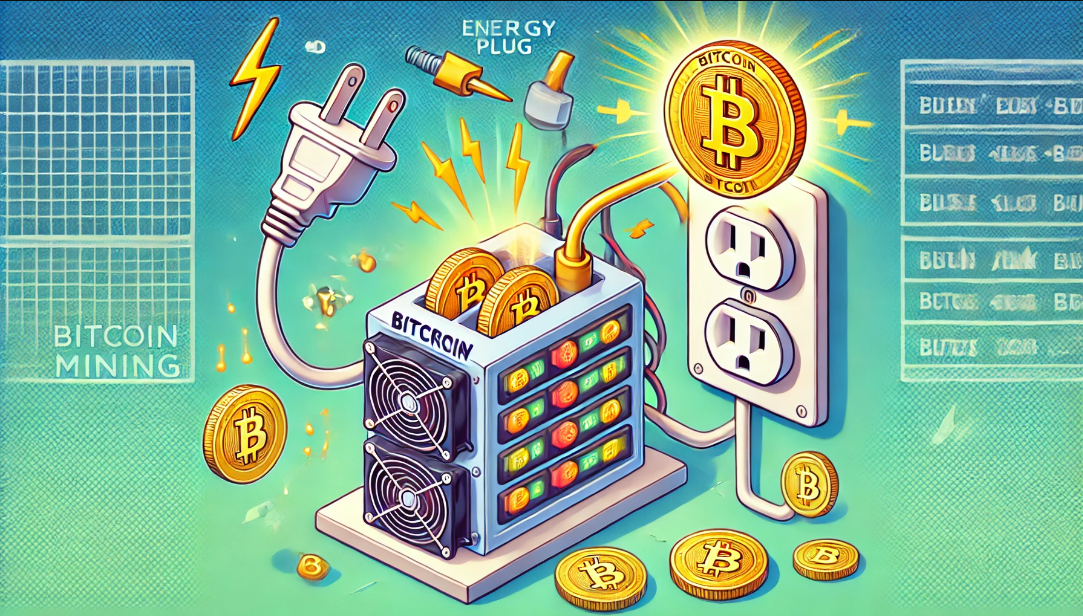How Bitcoin Mining Turns Electricity Into Digital Assets

Bitcoin mining is often described as a process of "creating" Bitcoin, but in essence, it’s a powerful example of transforming electrical energy into digital value. This process enables miners to convert electricity into an asset with real economic value: Bitcoin. Here’s a deeper look into how Bitcoin mining essentially converts electricity into a scarce and valuable digital asset.
Understanding the Bitcoin Mining Process
At its core, Bitcoin mining is a decentralized and energy-intensive process in which computers (called miners) work to solve complex cryptographic puzzles. These puzzles are part of the Proof-of-Work (PoW) mechanism, which secures the Bitcoin network. By solving these puzzles, miners validate transactions, add them to the blockchain, and earn new bitcoins as a reward.
This mining process consumes a considerable amount of electrical energy, which has prompted both criticism and innovation. To understand why electricity plays such a significant role, let’s break down each part of the mining process and see how it translates to value in Bitcoin.
How Electricity Becomes a Digital Asset
1. Processing Power Requires Electricity
Bitcoin mining relies on powerful hardware, specifically ASIC (Application-Specific Integrated Circuit) miners, designed to perform the SHA-256 hashing calculations required by Bitcoin's protocol. Each calculation consumes electricity, and miners run millions of calculations per second in a race to solve the puzzle and earn rewards.
This electricity usage drives the mining process, transforming raw energy into computational power that fuels the creation of Bitcoin.
2. Proof of Work as a Security Mechanism
The Proof of Work (PoW) consensus mechanism used by Bitcoin requires miners to demonstrate a commitment of resources—in this case, electricity and computing power. By making it costly and time-consuming to create new blocks, PoW adds security to the Bitcoin network.
In this context, the energy expended is a safeguard against attacks, making the blockchain tamper-resistant. It would require a tremendous amount of energy for an attacker to gain control over the network, a task that becomes less feasible as more energy is committed by miners worldwide.
3. Earning Bitcoin Rewards
When a miner successfully mines a block, they are rewarded with new Bitcoin. This reward essentially represents the conversion of electrical energy into a digital asset. The miner’s expenses—primarily electricity and hardware—are offset by the value of the Bitcoin they receive. In this way, mining can be seen as a form of energy-to-value conversion, where the asset generated is Bitcoin.
This Bitcoin can then be stored, sold, or traded, effectively transforming energy costs into financial gain. The value of Bitcoin on the market thus compensates miners for the energy invested, especially as Bitcoin’s scarcity and demand continue to grow.
4. Efficiency and the Search for Cheap Energy
The cost of electricity is a major factor in a miner’s profitability. This has driven miners to seek out cost-effective and sustainable energy sources, such as hydroelectric, wind, and solar power. In some cases, miners also use energy that would otherwise be wasted, like excess gas from oil production or surplus electricity during off-peak hours.
By finding cheaper energy sources, miners can reduce operational costs, effectively increasing the profit margin on each Bitcoin mined. This dynamic makes Bitcoin mining one of the most energy-efficient ways to convert surplus or renewable energy into digital assets.
Benefits of Converting Energy to Bitcoin
This unique transformation of energy into digital value offers several benefits:
- Decentralization: Because mining requires significant energy, Bitcoin’s security is distributed across numerous independent miners. This decentralization ensures that no single entity can easily control the network.
- Resistance to Censorship: The cost-intensive nature of PoW mining deters centralized control, making Bitcoin resistant to censorship and manipulation.
- Store of Value: As Bitcoin mining gradually becomes more energy-efficient, it maintains Bitcoin’s scarcity and value, offering a digital alternative to assets like gold.
- Energy Innovation: The demand for cheaper and renewable energy has spurred innovation in sustainable energy sources, which not only benefits the Bitcoin network but can also have positive environmental impacts.
Challenges of Converting Electricity into Bitcoin
While the process has significant benefits, it also presents challenges, primarily due to its environmental impact and high operational costs. Here are a few key challenges:
- Environmental Concerns: Bitcoin mining’s high energy consumption has raised concerns about its environmental impact, particularly if it relies on non-renewable sources. While there’s a growing shift toward renewable energy, the environmental footprint remains a challenge.
- Profitability and Market Volatility: Miners’ revenue depends heavily on the price of Bitcoin. If Bitcoin’s price drops significantly, mining may become unprofitable, especially for those with high electricity costs.
- Concentration of Mining Power: The search for cost-effective energy can lead to concentration in certain regions with cheaper electricity, potentially centralizing mining power geographically.
What Happens if Bitcoin Mining Stops?
If, hypothetically, all miners stopped mining due to high costs or regulatory issues, the network would be left vulnerable, and Bitcoin transactions would no longer be processed reliably. However, Bitcoin’s design includes an automatic adjustment to its mining difficulty. If miners leave the network, this difficulty level would decrease, making it easier (and less energy-intensive) for remaining miners to solve blocks, eventually restoring balance.
Conclusion: Electricity as Digital Value in Bitcoin Mining
In the Bitcoin network, electricity isn't just a utility cost—it’s the foundation for Bitcoin’s existence and security. By converting electricity into a digital, finite asset, Bitcoin mining introduces a revolutionary concept: energy as digital currency. This unique aspect of Bitcoin demonstrates the potential to store and transfer value on a global scale, rooted in secure and transparent processes.
The conversion of electricity into Bitcoin represents a fundamental shift in how value is created, sustained, and exchanged in the digital age. As technology evolves, Bitcoin mining continues to shape the future of digital assets, energy use, and economic systems worldwide.
This article presented by Loka Mining.
Loka is revolutionizing the Bitcoin mining ecosystem by directly connecting investors with Bitcoin miners through a decentralized mining pool and an upcoming permissionless forward hashrate marketplace protocol.
Loka enables investors to get Bitcoin at lower than market price without centralized & counter-party risks, and Bitcoin miners to access capital efficient financing and hedge their risk exposure by selling their future mining rewards.
Find out more about loka in https://lokamining.com — or access our mining pool aggregator on https://pool.lokamining.com
